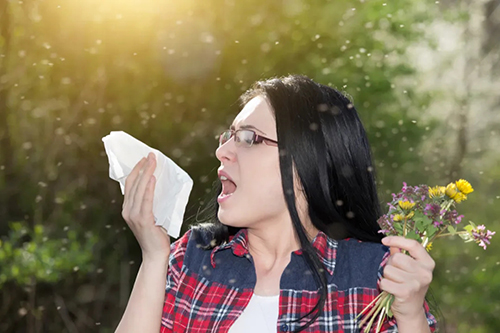Allergic rhinitis: the springtime trouble
Spring is the season of allergies and high incidence of allergic rhinitis.
The clinical manifestations of allergic rhinitis mainly include nasal obstruction, sneezing, and a runny nose, sometimes accompanied by the itching of eye, ear, or throat. These symptoms are very similar to the symptoms of the flu or the common cold, so many people will mistakenly identify them as such.
How to distinguish between allergic rhinitis and the flu?Allergic rhinitis rarely causes fever, and unlike the flu, the symptoms come regularly every year, and last for a long time.
Allergic rhinitis is usually associated with exposure to allergens, such as pollen, dust mites, animal hair, food, medicine, and so on. To prevent allergic rhinitis, we should try to avoid contact with allergens. The treatment of allergic rhinitis is done mainly by controlling the symptoms with medication. In severe cases, immunotherapy can be used.
Aviod allergensTake measures to avoid contact with allergens as much as possible.
Reduce outdoor activities when there is high incidence of allergies. The pollen concentration is highest from noon to afternoon. Avoid places with flowers, plants and trees. Wear masks when going out. Patients with severe symptoms may consider wearing goggles to reduce contact between conjunctiva and the pollen. Wash nasal cavity daily with normal saline water. Doors and windows should be kept closed.
Medication
Medication forms the basis for the treatment of allergic rhinitis. The most commonly used drugs are:1. Glucocorticoid is the first-line drug for the treatment of allergic rhinitis. Most commonly seen in the form of nasal spray. Some patients are afraid that the use of hormones will bring adverse reactions. However, as long as the medicine is used under the guidance of doctors, there no need to worry. When the medicine is used locally in the nose, it directly affects the nasal mucosa. The curative effect is outstanding. Moreover, because the medication is used locally, it will not cause obvious side effects, so nasal spray is suitable for long-term use. 2. Antihistamines (such as loratadine, cetirizine, etc), are so-called "antiallergic drugs". They have no obvious sedative effect and are widely used. They can relieve rhinitis such as runny nose, sneezing, itchy nose, as well as allergic conjunctivitis related symptoms such as red eyes, itchy eyes and tears.3. The leukotriene receptor antagonists can be used to treat allergic rhinitis, especially in combination with allergic asthma, and can also treat the upper and lower airways.4. Decongestant can quickly and effectively relieve the symptoms of nasal congestion, but it should be noted that the decongestant is only for short-term use, generally for no more than 7 consecutive days, to avoid the rebound of nasal congestion. 5. Mast cell membrane stabilizer (e.g. sodium cromoglycate) can stabilize mast cells and prevent cell degranulation. It is often used as a preventive medicine, and can also relieve itching, sneezing, runny nose, and other symptoms.
For seasonal allergic rhinitis patients, it is good to start preventive medication two weeks before the onset of the allergic season, so that symptoms can be controlled. The general medication needs to last until the end of allergic season. Spring season in normally from the middle of March to May, while autumn season is normally from the middle of July to October.
Allergen immunotherapyFor patients with severe allergic symptoms allergen specific immunotherapy can be considered. Immunotherapy has been widely used in the treatment of allergic rhinitis and asthma, and has achieved good results. This is the only treatment that has been shown to be effective in changing the course of allergic disease. The therapy can be performed when over 5 years old. It is a very long process. The course of immunotherapy takes at least 3 years. The success rate of desensitization treatment is similar in all countries, about 85%. During the treatment, regular reexamination is needed to evaluate the clinical treatment effect.
Allergic rhinitis can induce asthma, sinusitis, nasal polyps, secretory otitis media, and other diseases. Therefore, scientific and effective management of allergic rhinitis can effectively prevent the occurrence and development of the above complications.
 Home -> News& Information -> Medical Trends
Home -> News& Information -> Medical Trends 





